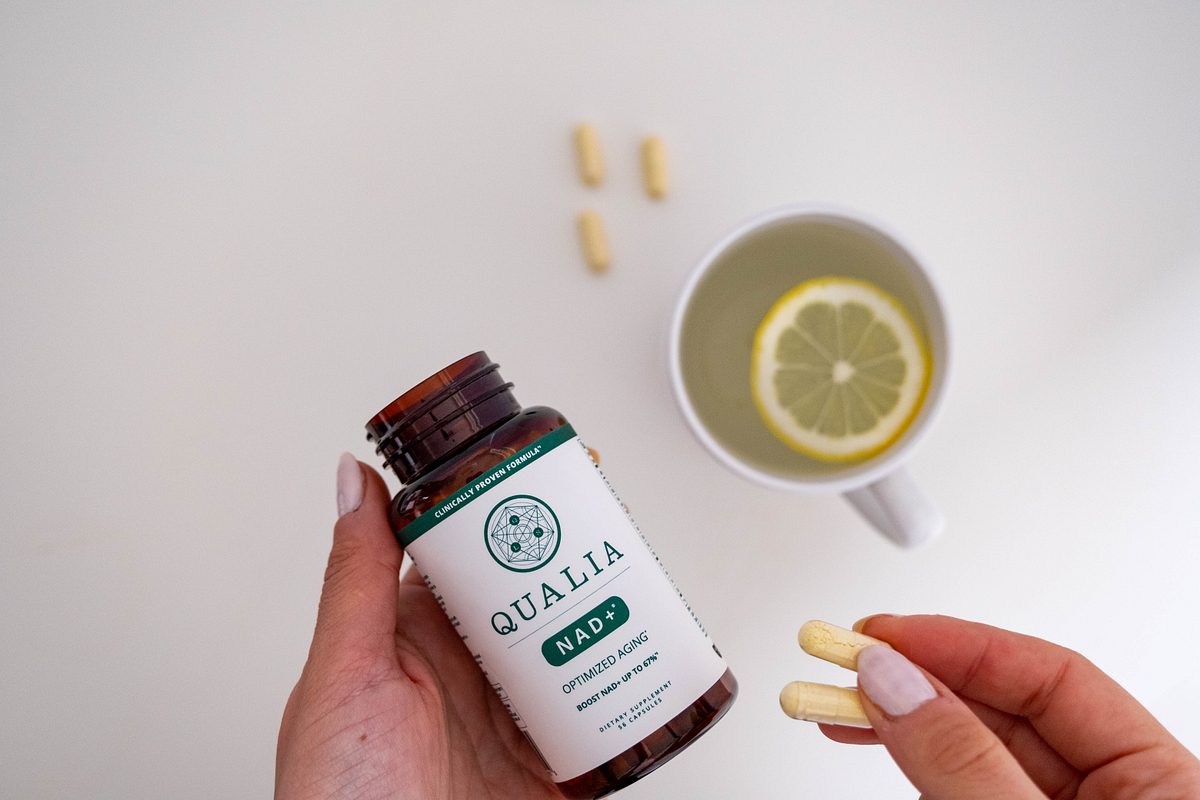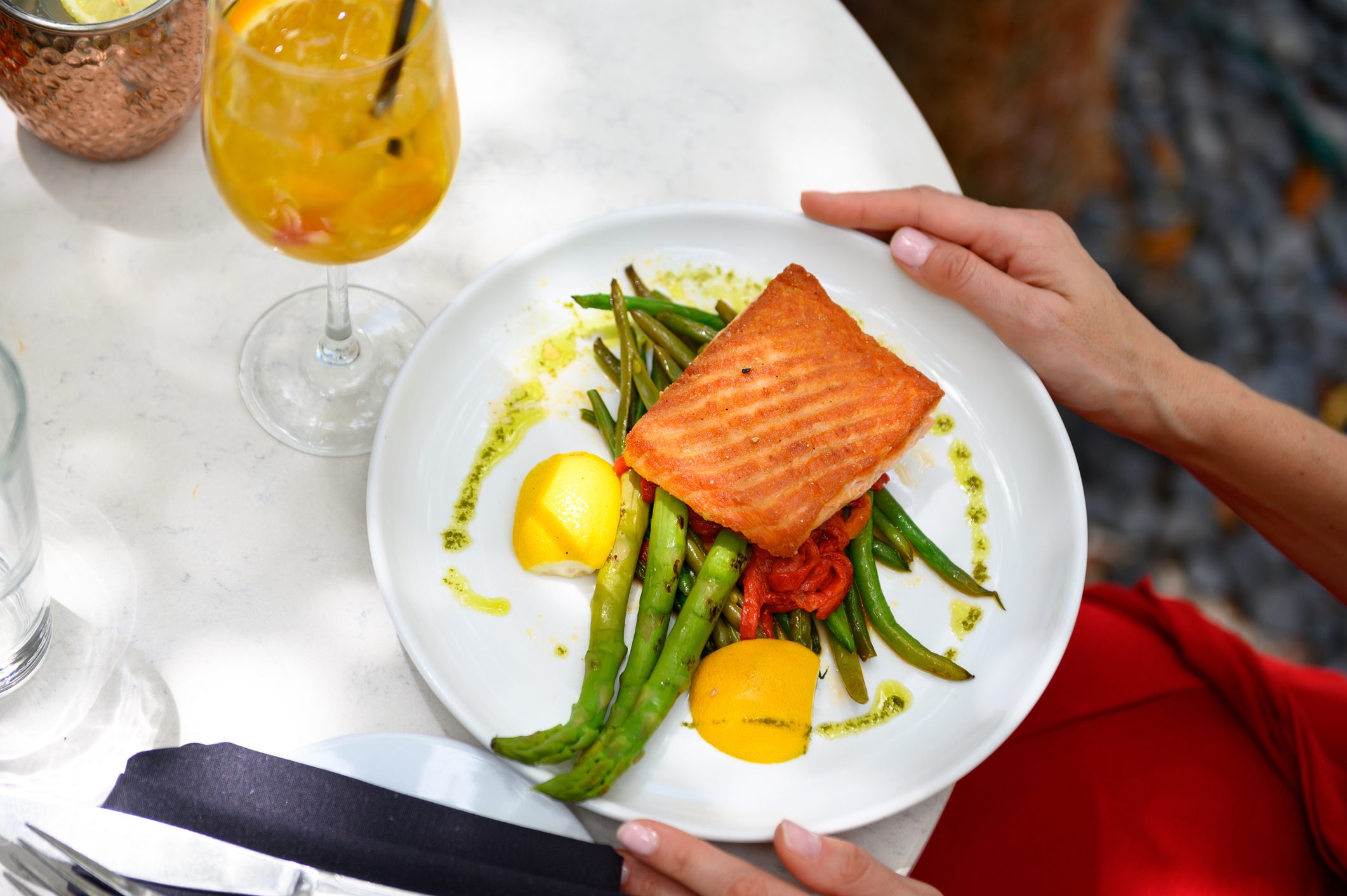Inflammation can heal or hurt your body, depending on the type. Acute inflammation refers to what results when you’re injured or get an infection. As immune cells rush to help, the problem area might feel achy, warm, red, or swollen.
This inflammation response is critical for healing an injury or infection. Once your immune system handles the problem, things taper down and your body returns to normal.
While acute inflammation can be lifesaving, chronic inflammation can be deadly. This simmering, low-grade inflammation remains activated as your immune system stays “on,” even when the response is no longer needed.
Among its havoc, chronic inflammation:
- Leads to insulin resistance, putting you at risk for diabetes1
- Contributes to gut conditions like leaky gut2
- Makes you hold on to belly fat3
In fact, researchers have connected chronic inflammation with nearly every disease on the planet.4 And what goes on the end of your fork has a major impact.
Perhaps the biggest dietary whammy comes from essential fatty acids (EFAs). We call them essential because your body can‘t make them, so they must come from food or supplements. There are two types of EFAs:
- Omega-3 fatty acids can help reduce inflammation, improve brain function, and lower the risk of heart disease.
- Omega-6 fatty acids provide some benefits, including healthy skin and hair, but too many can cause problems.
What Are Anti-inflammatory Foods?
The best anti-inflammatory foods tend to be high in omega-3 fatty acids, including wild-caught seafood, walnuts, chia, and flax seeds. Leafy and cruciferous greens can also help lower inflammation. These foods provide calming properties and a better balance of EFAs in the body.
Unfortunately, the prevalence of inflammatory foods today means we’re getting far more omega-6s that crowd out anti-inflammatory omega-3s. While our Paleolithic ancestors naturally ate a balance of these fatty acids, today we eat up to 25 times more omega-6s.5 That imbalance contributes to our rising obesity rates along with a myriad of other health problems.6 That’s why some experts call inflammation “the secret killer.”
Foods to Avoid on an Anti-Inflammatory Diet
Among the foods you should stay away from, the following five are massive drivers of chronic inflammation.
1. Sugar in Its Many Forms
When you consume a sugary, processed food or beverage, you raise blood sugar levels. This triggers the release of insulin, a hormone that regulates blood sugar.
Insulin pulls blood-sugar levels back to normal, but this hormone often overcompensates and pulls it down too low. If you’ve ever eaten a piece of cake and your energy levels crashed an hour later, that was inulin’s response to all that sugar!
This surge and subsequent crash in insulin and blood sugar can contribute to inflammation.7
Sugar can also impact the trillions of bacteria in your gut, which can eventually lead to systemic (or whole-body) inflammation long-term.8
Your body breaks down sugar into glucose and fructose. Almost every cell can utilize glucose, but only your liver can process fructose. Eat too much at once, and your liver gets overwhelmed. Studies show that fructose increases inflammation, which then raises levels of your stress hormone cortisol.9
Fructose also increases your risk of insulin resistance, when your body becomes less sensitive to insulin and has trouble regulating blood-sugar levels.10 Other research links fructose with obesity and fatty liver disease, both of which are associated with inflammation.11
When you’re ready to break free of sugar addiction once and for all, without the miseries that going cold-turkey can create, the Sugar Impact Diet is your go-to guide. People who have followed the Sugar Impact Diet had amazing results—most lost 10 pounds in just 2 weeks!
2. Vegetable Oils
Remember earlier when I said that an imbalance of omega-6 to omega-3 fatty acids can lead to higher inflammation levels? Vegetable oils are a big player here. While they might sound healthy, vegetable oils like soybean oil, corn oil, and canola oil are high in omega-6s.
These oils are also often highly processed and subjected to high heat, which can cause the oils to become rancid and produce harmful byproducts that contribute to chronic inflammation.12
Toxic vegetable oils hide everywhere, from packaged nuts and seeds to the meat and vegetables you eat in restaurants. You’ll want to avoid them like the plague. Read ingredient lists very closely, ask your servers to use healthier oils like avocado oil, and don’t let vegetable oils anywhere near your kitchen.
3. Factory Farmed Meat
You are what you eat, ate. While meat is the best way to meet your protein quota, the quality of that meat makes all the difference.
Factory-farmed animals are often fed a diet high in grains and soy, which can lead to an imbalance of omega-6 to omega-3 fatty acids. They are also frequently given antibiotics and hormones, which help them grow faster and prevent diseases that can spread easily.
Guess where those antibiotics and hormones end up? In the meat you consume. What’s more, factory-farmed animals are often kept in crowded and stressful conditions, which can lead to the release of stress hormones in their bodies.13 These stress hormones can contribute to inflammation when you eat that meat (and it’s not going to taste great, either).
Opt for the highest-quality meat you can find: read food labels and look for grass-fed and grass-finished beef.
4. Food Intolerances
In The Virgin Diet, I discuss seven foods that hurt your body. These foods have one thing in common: they fuel inflammation.
Eggs, for one, can be incredibly inflammatory. Conventionally raised hens are often fed corn, soybeans, and other foods that they’re not designed to eat.
The result? These hens produce eggs high in an inflammatory omega-6 fatty acid called arachidonic acid. Conversely, hens fed their natural diet receive a wider variety of nutrients, including vitamins, minerals, and antioxidants, which results in better-quality eggs.
For many people, egg intolerance shows up as symptoms delayed for a couple of days such as gas, bloating, and heartburn, and skin conditions such as eczema and psoriasis.
Every one of the seven foods I mention creates inflammation. How? Gluten contributes to leaky gut, and the accompanying gut-related inflammation becomes systemic inflammation. Research shows that a well-designed gluten-free diet can reduce inflammation, lower your risk of insulin resistance, and help you lose weight.14
Likewise, some experts like Izabella Wentz, PharmD, believe that soy can damage your thyroid and increase inflammation.15 Ditto with dairy: studies show that a protein called casein can contribute to gut inflammation.16
5. Dirty Processed Foods
In a perfect world, we would all eat fresh, organic, unprocessed foods. But in our fast-paced modern society, that isn’t always practical. You can choose healthy processed foods, but you’ve got to read labels extremely carefully.
Unfortunately, most processed foods don’t pass the test. By “dirty,” I’m talking about things like preservatives, sugars, potential food intolerances, and unpronounceable ingredients that can create or exacerbate inflammation. Studies also show that some artificial sweeteners prevalent in processed foods can be inflammatory.17
Clean processed foods have the opposite effect: they provide anti-inflammatory ingredients like coconut oil, unsweetened nut butters, and healthy sweeteners like allulose and stevia.
Meeting Your Essential Fatty Acid Quota to Reduce Inflammation
Research shows that eating an inflammatory diet significantly increases weight gain and puts you at a higher risk of becoming overweight or obese.18
The best way to reduce inflammation is by maintaining a balance of foods with omega-3 and omega-6 fatty acids. Anti-inflammatory foods, including wild-caught seafood, nuts like walnuts, and seeds like chia seeds, promote that balance.
Among their benefits, omega-3 fatty acids can support:
- Cellular functions, including how cells communicate
- Nervous system regulation (such as adapting to a stressful environment)
- Healthy blood-pressure levels
- Blood-sugar balance
- Strong muscles18
These and other benefits come from the anti-inflammatory and antioxidant activity of omega-3 fatty acids. Most of us don’t frequently eat wild-caught seafood or other omega-3 rich foods to get their therapeutic amounts, which makes supplementation essential to maintain that balance.
Omega Plus provides nearly a whopping 1 gram of anti-inflammatory omega-3 fatty acids in just one softgel. (Most supplements demand multiple softgels to get that amount.) This highly potent, non-GMO fish oil is derived from fish oils in their natural triglyceride (TG) form—the same way they naturally occur in fish.*
To provide you with more strategies to fight inflammation and maintain an anti-inflammatory diet, I’ve compiled my best blogs and episodes of Ask the Health Expert:
- 9 Ways to Dial Down Inflammation
- How Do I Test to See if I’m Inflamed?
- 3 Natural Ways to Fight Inflammation Without Deadly NSAIDs
- How to Use Spices to Reduce Inflammation and Burn Fat
- Eliminate Nagging Symptoms by Discovering Your Inflammatory Type
The Virgin Diet is the first step toward turning your weight and health goals into positive everyday actions. It has all the tools and resources you need to help you calm inflammation from hidden food sensitivities, reclaim your health, and feel energized and better than ever.
*These statements have not been evaluated by the Food & Drug Administration. Products mentioned are not intended to diagnose, treat, cure, or prevent any disease. The views in this blog by JJ Virgin should never be used as a substitute for professional medical advice. Please work with a healthcare practitioner concerning any medical problem or concern.
References:
- Chen L, Chen R, Wang H, Liang F. Mechanisms Linking Inflammation to Insulin Resistance. Int J Endocrinol. 2015;2015:508409. doi: 10.1155/2015/508409. Epub 2015 Jun 2. PMID: 26136779; PMCID: PMC4468292.
- Camilleri M. Leaky gut: mechanisms, measurement and clinical implications in humans. Gut. 2019 Aug;68(8):1516-1526. doi: 10.1136/gutjnl-2019-318427. Epub 2019 May 10. PMID: 31076401; PMCID: PMC6790068.
- Ellulu MS, Patimah I, Khaza’ai H, Rahmat A, Abed Y. Obesity and inflammation: the linking mechanism and the complications. Arch Med Sci. 2017 Jun;13(4):851-863. doi: 10.5114/aoms.2016.58928. Epub 2016 Mar 31. PMID: 28721154; PMCID: PMC5507106.
- Furman D, Campisi J, Verdin E, Carrera-Bastos P, Targ S, Franceschi C, Ferrucci L, Gilroy DW, Fasano A, Miller GW, Miller AH, Mantovani A, Weyand CM, Barzilai N, Goronzy JJ, Rando TA, Effros RB, Lucia A, Kleinstreuer N, Slavich GM. Chronic inflammation in the etiology of disease across the life span. Nat Med. 2019 Dec;25(12):1822-1832. doi: 10.1038/s41591-019-0675-0. Epub 2019 Dec 5. PMID: 31806905; PMCID: PMC7147972.
- Chris Kressner: How Too Much Omega-6 and Not Enough Omega-3 Is Making Us Sick
- Simopoulos AP. An Increase in the Omega-6/Omega-3 Fatty Acid Ratio Increases the Risk for Obesity. Nutrients. 2016 Mar 2;8(3):128. doi: 10.3390/nu8030128. PMID: 26950145; PMCID: PMC4808858.
- Ma X, Nan F, Liang H, Shu P, Fan X, Song X, Hou Y, Zhang D. Excessive intake of sugar: An accomplice of inflammation. Front Immunol. 2022 Aug 31;13:988481. doi: 10.3389/fimmu.2022.988481. PMID: 36119103; PMCID: PMC9471313.
- Satokari R. High Intake of Sugar and the Balance between Pro- and Anti-Inflammatory Gut Bacteria. Nutrients. 2020 May 8;12(5):1348. doi: 10.3390/nu12051348. PMID: 32397233; PMCID: PMC7284805.
- DiNicolantonio JJ, Mehta V, Onkaramurthy N, O’Keefe JH. Fructose-induced inflammation and increased cortisol: A new mechanism for how sugar induces visceral adiposity. Prog Cardiovasc Dis. 2018 May-Jun;61(1):3-9. doi: 10.1016/j.pcad.2017.12.001. Epub 2017 Dec 8. PMID: 29225114.
- Softic S, Stanhope KL, Boucher J, Divanovic S, Lanaspa MA, Johnson RJ, Kahn CR. Fructose and hepatic insulin resistance. Crit Rev Clin Lab Sci. 2020 Aug;57(5):308-322. doi: 10.1080/10408363.2019.1711360. Epub 2020 Jan 14. PMID: 31935149; PMCID: PMC7774304.
- Vos MB, Lavine JE. Dietary fructose in nonalcoholic fatty liver disease. Hepatology. 2013 Jun;57(6):2525-31. doi: 10.1002/hep.26299. Epub 2013 May 1. PMID: 23390127.
- DiNicolantonio JJ, O’Keefe JH. Omega-6 vegetable oils as a driver of coronary heart disease: the oxidized linoleic acid hypothesis. Open Heart. 2018 Sep 26;5(2):e000898. doi: 10.1136/openhrt-2018-000898. PMID: 30364556; PMCID: PMC6196963.
- Carrasco-García AA, Pardío-Sedas VT, León-Banda GG, Ahuja-Aguirre C, Paredes-Ramos P, Hernández-Cruz BC, Murillo VV. Effect of stress during slaughter on carcass characteristics and meat quality in tropical beef cattle. Asian-Australas J Anim Sci. 2020 Oct;33(10):1656-1665. doi: 10.5713/ajas.19.0804. Epub 2020 Jan 13. PMID: 32054158; PMCID: PMC7463084.
- Thyroid Pharmacist: How Avoiding Soy Can Benefit Hashimoto’s
- Soares FL, de Oliveira Matoso R, Teixeira LG, Menezes Z, Pereira SS, Alves AC, Batista NV, de Faria AM, Cara DC, Ferreira AV, Alvarez-Leite JI. Gluten-free diet reduces adiposity, inflammation and insulin resistance associated with the induction of PPAR-alpha and PPAR-gamma expression. J Nutr Biochem. 2013 Jun;24(6):1105-11. doi: 10.1016/j.jnutbio.2012.08.009. Epub 2012 Dec 17. PMID: 23253599.
- Basson AR, Rodriguez-Palacios A, Cominelli F. Artificial Sweeteners: History and New Concepts on Inflammation. Front Nutr. 2021 Sep 24;8:746247. doi: 10.3389/fnut.2021.746247. PMID: 34631773; PMCID: PMC8497813.
- Jianqin S, Leiming X, Lu X, Yelland GW, Ni J, Clarke AJ. Effects of milk containing only A2 beta casein versus milk containing both A1 and A2 beta casein proteins on gastrointestinal physiology, symptoms of discomfort, and cognitive behavior of people with self-reported intolerance to traditional cows’ milk. Nutr J. 2016 Apr 2;15:35. doi: 10.1186/s12937-016-0147-z. Erratum in: Nutr J. 2016;15(1):45. PMID: 27039383; PMCID: PMC4818854.
- Ramallal R, Toledo E, Martínez JA, Shivappa N, Hébert JR, Martínez-González MA, Ruiz-Canela M. Inflammatory potential of diet, weight gain, and incidence of overweight/obesity: The SUN cohort. Obesity (Silver Spring). 2017 Jun;25(6):997-1005. doi: 10.1002/oby.21833. PMID: 28544794.
- Gammone MA, Riccioni G, Parrinello G, D’Orazio N. Omega-3 Polyunsaturated Fatty Acids: Benefits and Endpoints in Sport. Nutrients. 2018 Dec 27;11(1):46. doi: 10.3390/nu11010046. PMID: 30591639; PMCID: PMC6357022.






